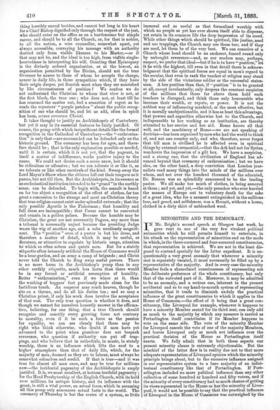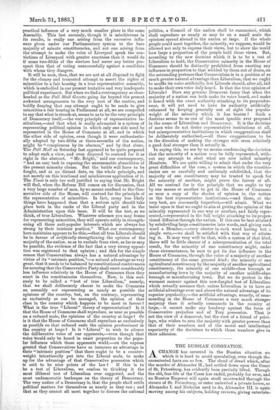MINORITIES AND THE DEMOCRACY.
IN Mr. Bright's second speech at Glasgow last week, he gave vent to one of the very few virulent political animosities which he still permits himself to entertain, in his attack on the representation of minorities and on the mode in which, in the three-cornered and four-cornered constituencies, that representation is achieved. We are not in the least dis- posed to contend specially for the latter expedient. It is un- questionably a very great anomaly that whenever a minority seat is separately vacated, it must necessarily be filled up by a representative of the majority. And in every case the minority Member feels a shamefaced consciousness of representing not the deliberate preference of the whole constituency, but only that of the outvoted part of it. Moreover, it may be admitted to be an anomaly, and a serious one, inherent in the present accidental and so to say hand-to-mouth system of representing minorities, that it tends to diminish unduly the practical influence of the great constituencies to which it applies in the House of Commons,—the effect of it being that a great con- stituency, like Liverpool for example, whenever it happens to have a minority Member seated for its third seat, can only add as much to the majority by which any measure is carried as Portarlington itself, contributes if its Member happens to vote on the same side. The vote of the minority Member for Liverpool cancels the vote of one of the majority Members, and leaves Liverpool only as much net influence over the practical decision of the House as Portarlington itself exerts. We fully admit that in both these aspects our present minority clause is extremely objectionable. But the mischief of the latter flaw is in reality due not to that more adequate representation of Liverpool opinion which the minority principle brings about, but to the excessive influence assigned in our representative system to a bare majority of an infini- tesimal constituency like that of Portarlington. If Port- arlington included no more political influence than any other collection of some hundred or hundred and fifty voters, and if the minority of every constituency had as much chance of getting its views represented in the House as has the minority of laver- pool, it would not be possible to say that the practical influence of Liverpool in the House of Commons was outweighed by the
practical influence of a very much smaller place in the same Assembly. This last anomaly, though it is mischievous in its results, is really one arising from the excessive influ- ence given under our Parliamentary system to the bare majority of minute constituencies, and not one arising from the attempt to make the voice of Liverpool speak the con- victions of Liverpool with greater exactness than it would do if some two-fifths of the electors had never any better pro- spect than that of voting unsuccessfully against a candidate with whom they disagree.
It will be seen, then, that we are not at all disposed to fight for the clumsy and truncated attempt to assert the rights of minorities to a fair hearing in a true representative assembly, which is embodied in our present tentative and very inadequate political experiment. But when we find a contemporary as clear- headed as the Pall Mall Gazette going far beyond the present awkward arrangements to the very root of the matter, and boldly denying that any attempt ought to be made to give minorities a fair hearing in Parliament at all, we are compelled to say that what is struck-at, seems to us to be the very principle of Democracy itself,—the very principle of representative in- stitutions,—and that what is really advocated is a system of representing political opinion in which only one side need be represented in the House of Commons at all, and in which the other side of opinion, even though it were enthusiastic- ally adopted by two-fifths or three-sevenths of the nation, might be "conspicuous by its absence," and by that alone. The Pall Mall on Saturday last appeared to be quite prepared to adopt such a view, and even disposed to contend for it as right in the abstract. "Mr. Bright," said our contemporary, "had an easy task in exposing the unreasonable absurdities of the present minority clause. But the battle will have to be fought, and at no distant date, on the whole principle, and not merely on this irrational and mischievous application of it. The Times is only too well justified in saying that Mr. Bright will find, when the Reform Bill comes on for discussion, that a very large number of men, by no means confined to the Con- servative side of the House, will contend for the principle of the representation of minorities. In fact, many less likely things have happened than that a serious split should take place both in the ranks of the Liberal party and in the Administration upon this issue. It will be the test, as we think, of true Liberalism. Whatever schemes you may frame for representing minorities, they will operate solely in strength- ening all those anti-popular interests which are always too strong by their intrinsic position." What our contemporary here maintains appears to be this,—that all true Liberals should be in favour of artificially strengthening the opinion of the majority of the nation, so as to exclude from view, as far as may be possible, the evidence of the fact that a very strong opposi- tion was registered to that opinion ; and this for the simple reason that Conservatism always has a natural advantage by virtue of its "intrinsic position,"—a natural advantage so very great, that it needs to be balanced by constitutional contrivances for securing that the Conservative Party shall exert considerably less influence relatively in the House of Commons than they exert in the constituencies themselves. Now, is this seri- ously to be called a "test of true Liberalism," namely, that we shall deliberately choose to make the Commons an assembly not representing as nearly as possible the opinions of the country, but, on the contrary, representing as exclusively as can be managed, the opinion of that class in the country which happens to be most in favour ? What is the true " Liberal " theory of representation? Is it that the House of Commons shall reproduce, as near as possible on a reduced scale, the opinions of the country at large ? Or is it that the House of Commons shall reproduce as exclusively as possihie on that reduced scale the opinion predominant in the country at large Is it "Liberal" to wish to silence the daliberative voice of our opponents,—even though that voiceliiould only be heard in exact proportion to the popu- lar influence which those opponents wield,—on the express ground that Conservatives have so immense an advantage in their "intrinsic position" that there ought to be a counter- weight intentionally put into the Liberal scale, to make up for the advantage of that Conservative possession which
is said to be nine points of the law ? If this is to be a test of Liberalism, we confess to thinking it the most illiberal test of Liberalism ever suggested, and the most undemocratic hurlesque on the theory of Democracy. The very notion of a Democracy is, that the people shall settle political matters for themselves as nearly as they can ; and that as they cannot all meet together to discuss the national
politics, a Council of the nation shall be summoned, which shall reproduce as nearly as may be on a small scale the opinions spread abroad in the nation at large. If the whole people could meet together, the minority, we suppose, would be allowed not only to express their views, but to show the world how large a proportion of the people hold those views. But, according to the new doctrine which it is to be a test of Liberalism to hold, the Conservative minority in the House of Commons should be distinctly prohibited from exerting any influence in proportion to that wielded by them out of doors, on the astounding pretence that Conservatism is in a position of so much greater natural advantage than Liberalism, that we ought to muffle its voice artificially, lest Liberals should, after all, fail to make their own voice duly heard. Is that the true opinion of Liberals? Does any genuine Democrat fancy that when the majority of a nation can both make its voice heard, and make it heard with the exact authority attaching to its preponder- ance, it will yet need to have its authority artificially enhanced by keeping generally out of sight the popular weight of the minority which it has beaten Such a doctrine seems to us one of the most ignoble ever proposed in the name of Liberalism and Democracy. It is the doctrine of men who do not desire representative institutions at all, but misrepresentative institutions in which exaggerations shall be deliberately authorised,—all these exaggerations to be in the direction of making the stronger side seem relatively a good deal stronger than it actually is.
In saying this, we are by no means condemning the doctrine that the minority of a nation may be fully represented, with- out any attempt to elect what are now called minority Members. We are quite willing to admit that under the very great difficulties of the case, a system in which the constitu- encies are so carefully and uniformly subdivided, that the majority of one constituency may be trusted to speak for the minority of another, might prove the fairest of all. All we contend for is the principle that we ought to try by one means or another to get in the House of Commons as near a copy of the shades of opinion in the nation as the best representative institutions,—and these, at the very best, are necessarily imperfect,—will admit. What we insist upon is that we ought to aim at getting the opinion of the minority represented in one way or another, and fairly repre- sented,—represented in the full weight attaching to its propor- tional diffusion through the nation. If this can be best attained by subdividing large constituencies into wards, and giving each ward a Member,—every elector in each ward having but a single vote,—we shall be satisfied with that way of attain- ing it. It may very well be that, with a system of that kind, there will be little chance of a misrepresentation of the total result, for the minority of one constituency might, under these circumstances, be sure to get its due influence in the House of Commons, through the voice of a majority of another constituency of the same general kind ; the minority of one agricultural constituency by the majority of another agricultural constituency, the minority of one middle-class borough or manufacturing town by the majority of another middle-class borough or manufacturing town. But we do protest in the warmest manner against this new-fangled test of Liberalism which actually assumes that, unless Liberalism is to have an artificial advantage over and above the natural advantage of its superior popularity,—the artificial advantage, namely, of com- manding in the House of Commons a very much stronger majority than it actually commands in the country at large,—it cannot make any headway against the force of Conservative prejudice and of Tory possession. That is not the view of a democrat, but the view of a friend of privi- lege, who wishes to arm the majority with greater powers than that of their numbers and of the moral and intellectual superiority of the doctrines to which those numbers give in their adhesion.



































 Previous page
Previous page